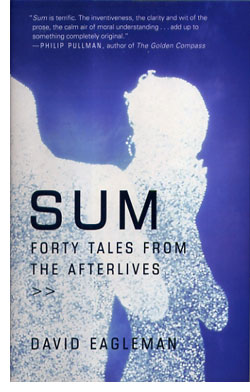 |
 |
 David Eagleman
David Eagleman
Sum: Forty Tales from the Afterlives
Pantheon / Random House
US First Edition Hardcover
ISBN 978-0-307-37734-0
Publication Date: 02-10-2009
120 Pages; $20.00
Date Reviewed: 03-09-2009
Reviewed by: Rick Kleffel © 2009
Index:
Science Fiction
Fantasy
General Fiction
Non-Fiction
Editor's Note: Here is a book that is well worth searching out in hardcover, a book that you will read again and again because it is easy, delightful and thoroughly thought-provoking. Whenever I pass by, I pick it up and read a few afterlives. To my mind, this is the sort of book that should be nominated for and win the major speculative fiction awards, but alas, it would only do so in a world that is the result of speculative fiction.
OK, let's start with this delightful premise:
You're dead.
Now what? Assuming you — your soul, that perceptive being that creates a narrative for itself — continue to exist, what, precisely, might you be perceiving? What are the parameters of the afterlife? The answers to these questions are generally left to religion; but that doesn't have to exclusively be the case. Unfortunately, technology has not yet advanced to the point where we can track perceptual data after death. This isn't to say that it's impossible, just that it's impossible now. So the only kind of experiments we can really conduct are thought-experiments; and they may tell us as much about ourselves as they will about the afterlife.
It seems almost impossibly audacious. One man decides to define the afterlife — forty times. But in 'Sum: Forty Tales from the Afterlives,' David Eagleman gets on that high-wire and struts effortlessly from one vision to the next. Eagleman, a neuroscientist, and thus well-placed to be there should we create a means for retrieving perceptual data after death, manages to find the perfect prose style with which to engage in a consistently entertaining thought experiment. Perhaps this is because if there is an afterlife, our experience of it might closely resemble that of reading. Reading, heaven or hell, you decide.
Eagleman's book is quite simple in execution. You get forty short vignettes, just over one hundred pages total, each of which is a thought experiment in which the afterlife is defined, then described. Though Eagleman is a neuroscientist, this is not a work of science; and though the afterlife is the province of religion, and God, in a variety of incarnations, is a frequent (though not constant) presence, 'Sum' is not a work of theology. If anything, it most resembles the science fiction of Stanislaw Lem. The prose is as crystalline as the thoughts. The scenarios for the afterlife are quickly set up and the then rigorously and succinctly extrapolated.
The book begins with "Sum," in which it is envisioned that the afterlife consists of the moments of our lives, re-arranged so that we first, say, clip our nails for six days straight; then perhaps you spend, "Two days lying. Six weeks waiting for a green light. Seven hours vomiting." You get the idea. For this reader, this beginning was quite reminiscent of Lem's, "One Human Minute," in which the author calculates how many people are engaged in a given activity on the globe during any particular minute. But not just in concept, because, obviously, statistics tell us that statistics themselves will eventually be parsed every which way they can. No, where Eagleman shines, again and again is the joyous clarity of his prose. 'Sum' is the science fiction / scientific equivalent of a book of powerful prayers, set in the format of, "There, but the grace of being alive, go I."
Eagleman has a knack for approaching religious visions with a style that makes them not just palatable but enjoyable to those who don't hold religious beliefs. He writes without fear, with incredible grace and a very nicely understated sense of humor. This little hardcover is fantastic gift for just about any reader, because everyone will find something to enjoy within. Moreover, it's short enough and punchy enough to actually get read. It's never morbid, though some may now and again find the visions it presents upsetting. Turn the page and another vision awaits you.
Eagelman himself is an interesting fellow and his website is well worth your time to visit. He's co-authored a work with Richard Cytowic, who wrote what has in the long run proved to be my introduction to neuroscience, 'The Man Who Tasted Shapes,' a study of synaesthesia. Eagleman himself is engaged in studies of this (sort of) disorder wherein sensory data are blended. I suppose that should come as no surprise. 'Sum' is indeed the sum of a number of interesting ideas and words, and the book as a whole is indeed far greater than sum of its parts.
|
 |
|
|
 |
| |
Review Archive
All Reviews alphabetized by author.
General Fiction
Non-Genre, general fiction and literature.
Horror
Supernatural fiction, supernatural horror and non-supernatural horror.
Science Fiction
Science fiction, science fantasy, speculative fiction, alternate history.
Fantasy
Fantasy, surrealism and magic realism.
Mystery
Crime, thrillers, mystery, suspense.
Non-Fiction
Non-Fiction, True Crime, Forteana, Reference.
Poetry
|
|
 |
|




